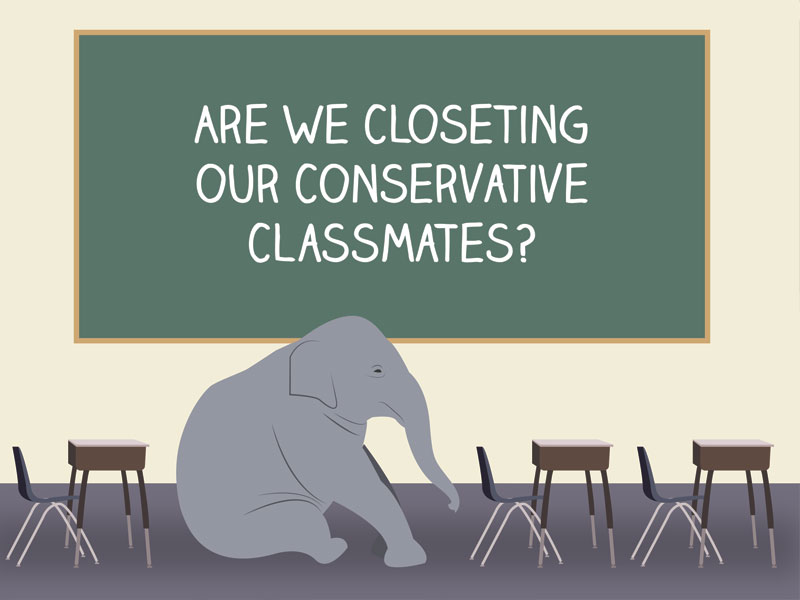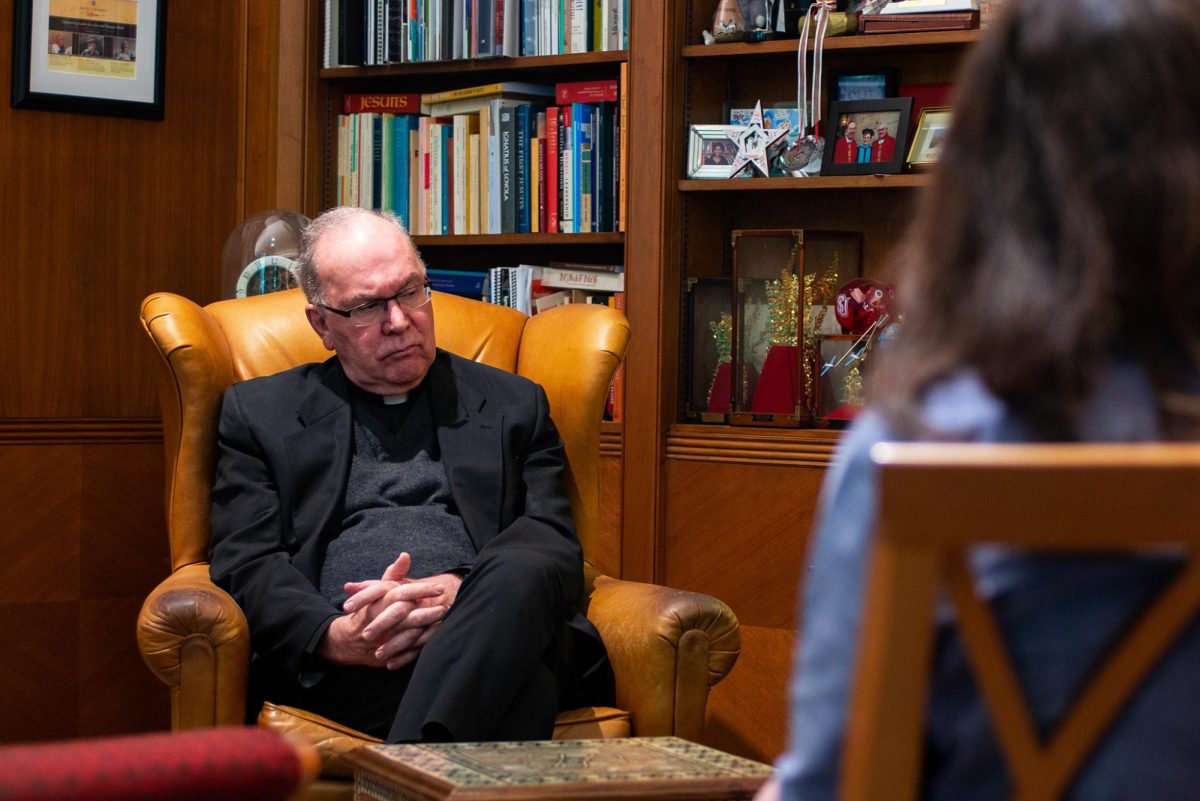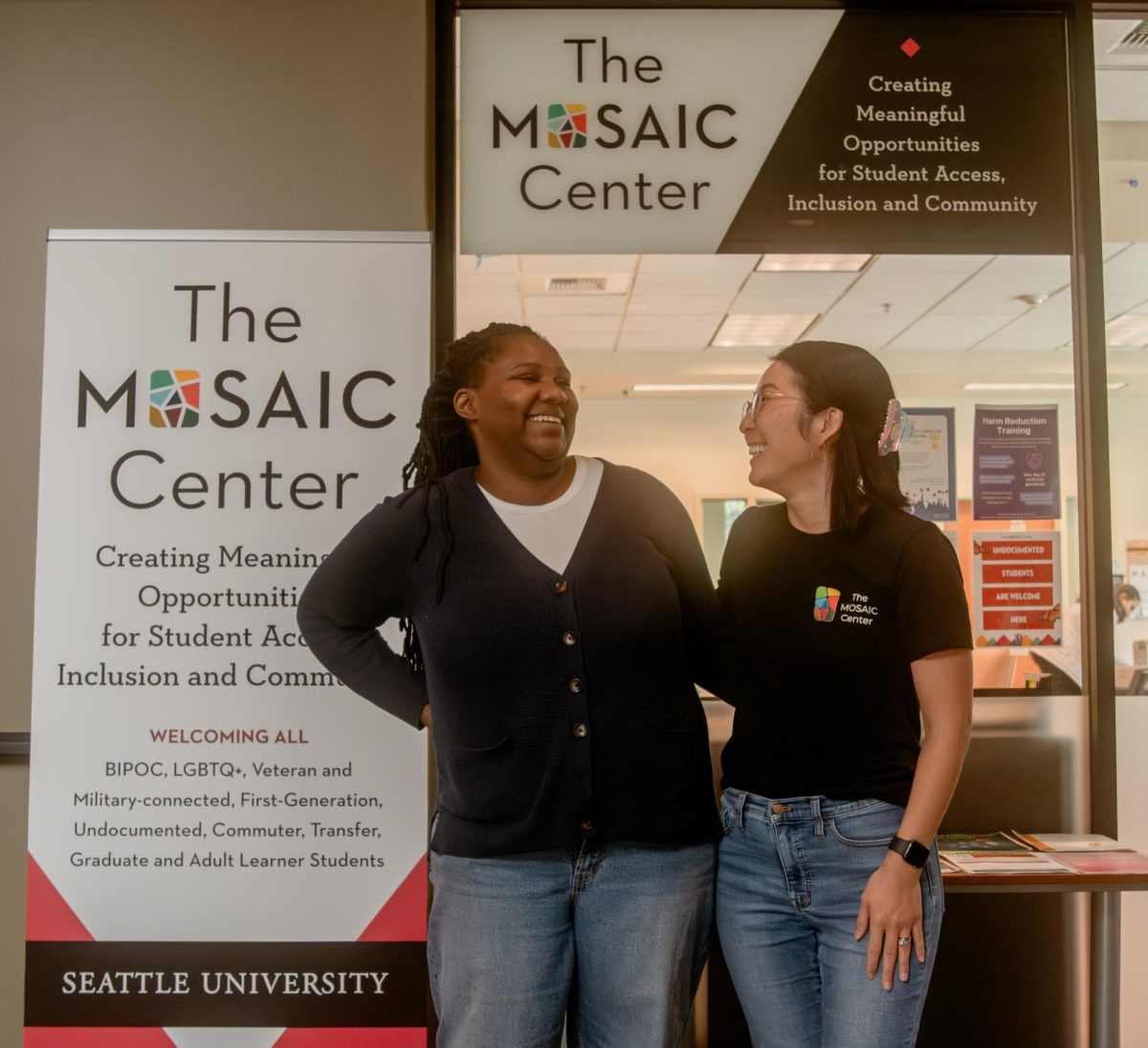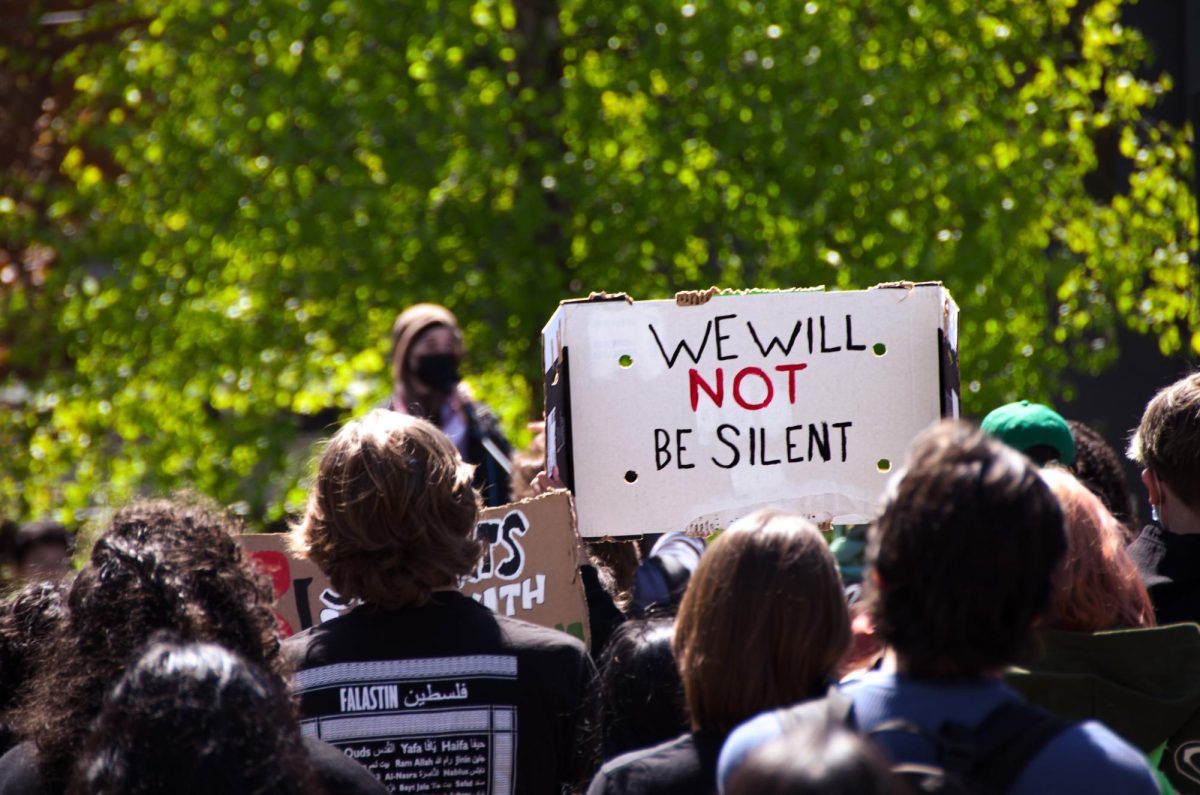For some conservative students on campus, the elephant in the room is one’s own conservative views.
Grace Wall is a self-proclaimed conservative, libertarian-leaning freshman at Seattle University. She hails from the genial town of Madison, Wis.
“I’ve always been very passionate about the abortion issue just because I personally believe that life begins at conception and that…” She trails off to a complete pause. Her gaze falls to a father and toddler who are stopped at a drinking fountain about five feet away. Sporadic splashes of water are the only sound in the ten-foot radius. Her voice hushes to a near whisper. “That’s not a very common viewpoint here.”
The “viewpoint” being anti-abortion, or more broadly, conservatism. The “here” she refers to is Seattle U.
“The general atmosphere on campus towards people who tend to lean conservatively is so negative that I find that a lot of us tend to not say our opinion unless we know for a fact that we’re among people who agree,” Wall said.
Wall is a member of a minority group on campus: conservatives.
The few who belong to Seattle U’s political minority echoed two major arguments.
First, that their views are often times excluded and devalued on campus. Second, they keep their voices down, both in the classroom and with friends, to avoid tension.
But with the 2016 Presidential campaign upon us, it’s more important than ever that Seattle U students learn to engage in a balanced political discussion—both in and out of classrooms.
“I don’t really share my opinion much during class discussions because I know it’ll be shot down. Or people will think of me differently and I would rather them think of me highly than express my political views,” said humanities for leadership and political science sophomore Jon Cantalini.
Cantalini and Wall are not alone in this regard.
“It doesn’t feel like a safe environment to speak your ideas because it is much more that the rest of the group is in one boat and you’re kind of in your own boat,” said political science and vocal performance freshman Maggie Roberts. “It’s kind of more mob mentality here.”
Roberts is a member of the Seattle U Students for Life club, which is most commonly associated with the anti-abortion movement. The club also opposes capital punishment and assisted suicide.
According to the Students for Life club, Seattle U has morphed into a political bubble of sorts in which political discourse primarily veers towards the left of the political spectrum. As a result, conservative ideas are virtually excluded from all discussions, unless they’re presented in a mocking manner.
Freshman economics major and self-proclaimed conservative Jackson Evoniuk said that liberal students, whose ideas are supported by the majority, are at a disadvantage.
“I feel like Republicans are almost lucky—conservatives are almost lucky—because they’re exposed to constant challenges and they strengthen their ideas and learn more about the issues,” Evoniuk said. “But then people who are very liberal and only see people agreeing with them, they don’t get that same education.”
More students emphasized how crucial it is to hear opposing viewpoints.
“If you only see one side of the story, you don’t get that challenging of your viewpoint. You don’t get that check to make sure your logic is going in the right direction or it makes sense,”
Wall said.
Some argued that Seattle U professors further the political bias in their classrooms by assuming the majority of their students are liberals.
“Professors just usually make a generalization that everyone in the class has a similar viewpoint. And so I think usually they’ll use examples kind of in a mocking manner, not necessarily candidates of both parties but usually primarily the conservative,” Roberts said.
Even when the assumption that everyone in the room shares similar viewpoints may be correct, classes can always benefit from acknowledging conservative beliefs without belittling them.
Creating an environment where students are able to speak passionately about their beliefs can help them develop the important skill of taking both sides of an argument into account.
“They implicitly kind of put down conservative viewpoints as discriminatory and oppressive,” said electrical engineering senior and Seattle U Students for Life member Alex Kvenvolden.
Robert Aguirre, a professor of literature and composition, is intentionally transparent about his political beliefs during class.
“Let’s just say I’ve never really liked professors who purposefully try to come across as sort of immune to the world or utterly objective. I find that I bit disingenuous in a way because through their silence, they’re already being somewhat political.”
Aguirre, who is a strong proponent of open discourse, stressed the distinction between just and unjust dialogue.
“We should never be barring conservative views at all,” Aguirre said. “But what we must distinguish between is rebuttal and rejection, dialogue and condescension and rejection.”
Many Republican students avoid sharing their ideas in the classroom out of fear of condemnation. According to Aguirre, filtering ideas this way is dangerous.
“I always say that being shy in the classroom, being reserved to a certain extent, is a form of selfishness…” Aguirre said. “And no matter one’s political stripe, you’ve got to throw the ideas out there. Let them get batted around. Because it may impact you in ways that you’ve never seen and it may impact other students in ways that they hadn’t thought about.”
Humanities for teaching sophomore Brinkley Johnson, who declined to state her political stance, is an integral part of the Seattle U Students for Life club. She expressed the challenge of expressing her more conservative beliefs on campus without being labeled as a Republican.
“Stereotypes are so real,” Johnson said. “Like when I say that I’m pro-life, and then all of the sudden, I’m marked as a super to-the-right person.”
While Johnson strongly advocates for the anti-abortion movement and even flew to San Francisco last month to participate the Walk for Life rally, a rally that aims to change perceptions about abortion being an option, she certainly doesn’t fit into the traditional conservative box. In fact, her favorite presidential candidate is Bernie Sanders.
“I just really appreciate how radical he is, even if he’s a socialist. Like, that’s great. I really think our country is in a deep need of change,” Johnson said.
Johnson contended that assumptions made by fellow students about her ideologies highlight a pattern of generalizations on campus.
“I feel like I personally am breaking a lot of stereotypes in my different identities, in my values, and for some reason this school really upholds stereotypes, while at the same time trying to fight them,” she said.
Johnson is joined by others in the quest to minimize generalizations on campus.
Cantalini is passionate about ending homelessness, and said that it’s an example of an issue that anyone can care about, regardless of political philosophies.
“It’s not about being a Republican or a democrat, it’s not about being a Christian or an Atheist,” Cantalini said. “It’s about coming together and helping the people who do live on the streets… I think it’s an issue that everyone can get behind, no matter what political ideology you’re a part of.”
For many, the word “conservative” connotes images of confederate flags and the infamous Donald Trump. However, none of the Republican students interviewed supported the radical candidate. In fact, most denounced him completely.
“I hate Donald Trump as a whole… He is everything that the Republican Party is not,” said Cantalini, whose personal favorite is Marco Rubio.
“He’s disingenuous and dishonest and it seems like he’s just parroting views that he thinks Republicans would have,” Evoniuk said. He intends to vote for Ted Cruz. “[Cruz] appreciates the importance of American values and limited government and is traditional, socially and economically conservative.”
Though they shy away from expressing these views during class, some Seattle U conservatives said that the anti-abortion movement, limited government and traditional family values are issues of high importance to them.
“I think it’s very odd that so many conservatives on campus choose not to speak out,” Wall said. “I’ve always had the experience where if you eloquently explain your position or you just make it logical, people tend to be like, ‘Okay, I see where you’re coming from. I disagree, but…’ So I think it’s important to share your opinions.”
With a puff in her chest, Wall added one final thought: “I think Voltaire once said, ‘I [do not] agree with what you have to say, but [I’ll defend] to [the death] your right to say it.’”
The editor may be reached at [email protected]













